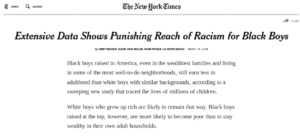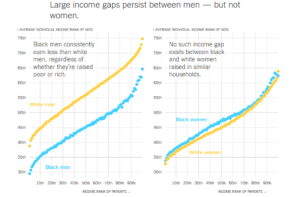Why are we so blind to sexism that hurts men and boys?
This week’s New York Times article, Extensive Data Shows Punishing Reach of Racism for Black Boys, is important, in my opinion, for many reasons. It brings up important factors including race and class.

NY Times: Extensive Data Shows Punishing Reach of Racism for Black Boys
I feel compelled to address a factor that everyone seems happy to ignore: sexism hurting men and boys. This quote highlights my point:
“One of the most popular liberal post-racial ideas is the idea that the fundamental problem is class and not race, and clearly this study explodes that idea,” said Ibram Kendi, a professor and director of the Antiracist Research and Policy Center at American University. “But for whatever reason, we’re unwilling to stare racism in the face.”
in that, while calling out what’s staring us in the face, it ignored sexism hurting males staring us in the face. The article only used the word “sexism” once, referring to sexism hurting women, despite much in it documenting male suffering. Here’s one example:

NY Times data on black boys
The topic of men and boys suffering is more on my mind than usual since I read this eye-opening Warren Farrell interview yesterday (I haven’t gotten to part 2 yet).
Here’s a quote that somehow didn’t lead the New York Times to see sexism hurting men and boys:
If such inherent differences existed by race, “you’ve got to explain to me why these putative ability differences aren’t handicapping women,” said David Grusky, a Stanford sociologist who has reviewed the research.
or
If this inequality can’t be explained by individual or household traits, much of what matters probably lies outside the home—in surrounding neighborhoods, in the economy and in a society that views black boys differently from white boys, and even from black girls.
Few people could read a statement such as
The research makes clear that there is something unique about the obstacles black males face
and not suspect race being a factor. Why not sex? Is it so hard to imagine that men holding positions of political and business power doesn’t mean that all men have such power? Why don’t people see men being injured on the job, homeless, and jailed more as signs of what being a man means?
How do people only see racism but not sexism in the following:
Other studies show that boys, across races, are more sensitive than girls to disadvantages like growing up in poverty or facing discrimination. While black women also face negative effects of racism, black men often experience racial discrimination differently. As early as preschool, they are more likely to be disciplined in school. They are pulled over or detained and searched by police officers more often.
“It’s not just being black but being male that has been hyper-stereotyped in this negative way, in which we’ve made black men scary, intimidating, with a propensity toward violence,” said Noelle Hurd, a psychology professor at the University of Virginia.
I could go on with more quotes, but I’ll summarize:
What does it take for people to see sexism that hurts men?
How much do men have to suffer for being men for people to see that just because some men have power doesn’t mean that all do?
What does it take for people to feel compassion and empathy for men and boys for being male?
If these questions make you curious, I recommend reading the Warren Farrell pieces linked to above.
Read my weekly newsletter

On initiative, leadership, the environment, and burpees
Pingback: More missing sexism when it hurts men | Joshua Spodek
Pingback: Should I write on more controversial issues? | Joshua Spodek
Pingback: Why are we blind to sexism hurting men, take 4: Central Park false accusation » Joshua Spodek
Pingback: We respond differently when society conflicts with men versus with women » Joshua Spodek